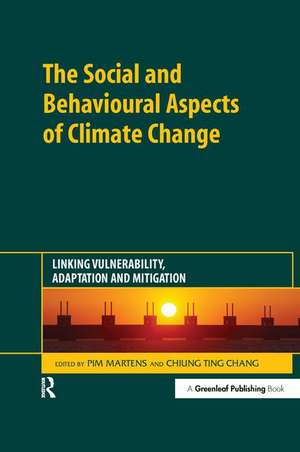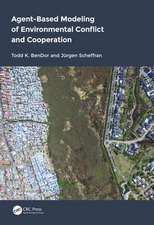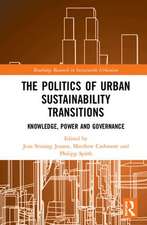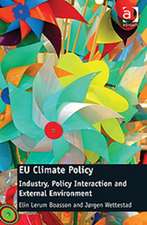The Social and Behavioural Aspects of Climate Change: Linking Vulnerability, Adaptation and Mitigation
Editat de Pim Martens, Chiung Ting Changen Limba Engleză Hardback – sep 2010
The book argues that the inherent complexity of climate change will ultimately require a much more integrated response both scientifically – to better understand multiple causes and impacts – as well as at the scientific/policy interface, where new forms of engagement between scientists, policy-makers and wider stakeholder groups can make a valuable contribution to more informed climate policy and practice.The book is particularly timely as the scientific research and policy debate is shifting from one of problem-framing to new agendas that are much more concerned with implementation, the improvement of assessment methodologies from a multi-disciplinary perspective, and the reframing of current scientific understanding towards mitigation, adaptation and vulnerability. A critical element in responding to the climate change challenge will be to ensure the translation of these new scientific insights into innovative policy and practice "on the ground". This book provides some fundamental elements to answer this need.The Social and Behavioural Aspects of Climate Change: Linking Vulnerability, Adaptation and Mitigation will be essential reading for social science researchers and policy managers in the area of climate change, as well as for those who want to know what the social and behavioural sciences can contribute toward coping with climate hazards. NGOs, law firms and businesses in the energy sector or other climate related fields will also find the book of great value.
Preț: 850.59 lei
Preț vechi: 1142.12 lei
-26% Nou
Puncte Express: 1276
Preț estimativ în valută:
162.76€ • 170.39$ • 134.67£
162.76€ • 170.39$ • 134.67£
Carte tipărită la comandă
Livrare economică 07-21 aprilie
Preluare comenzi: 021 569.72.76
Specificații
ISBN-13: 9781906093426
ISBN-10: 1906093423
Pagini: 320
Ilustrații: Illustrations, maps
Dimensiuni: 156 x 234 x 22 mm
Greutate: 0.61 kg
Ediția:1
Editura: Taylor & Francis
Colecția Routledge
Locul publicării:Oxford, United Kingdom
ISBN-10: 1906093423
Pagini: 320
Ilustrații: Illustrations, maps
Dimensiuni: 156 x 234 x 22 mm
Greutate: 0.61 kg
Ediția:1
Editura: Taylor & Francis
Colecția Routledge
Locul publicării:Oxford, United Kingdom
Public țintă
PostgraduateCuprins
Preface 1. The social and behavioural aspects of climate change: linking vulnerability, adaptation and mitigation Chiung Ting Chang and Pim Martens, ICIS, Maastricht University, The Netherlands, and Bas Amelung, Amelung Advies, The Netherlands Part I: Industries2. Climate change and inland navigation between the Netherlands and Germany: an economic analysis Erhan Demirel, Jos van Ommeren and Piet Rietveld, Department of Spatial Economics, VU University, The Netherlands 3. Climate change impacts: the vulnerability of tourism in coastal Europe Alvaro Moreno, ICIS, Maastricht University, The Netherlands 4. Corporate responses to climate change: the role of partnerships Ans Kolk and Jonatan Pinkse, University of Amsterdam Business School, The Netherlands Lia Hull Van Houten, Van Houten Communications, USA 5. Energy conservation in Dutch housing renovation projects Thomas Hoppe, Hans Bressers and Kris Lulofs, Centre for Studies in Technology and Sustainable Development (CSTM), The Netherlands Part II: Local communities6. Natural hazards, poverty traps and adaptive livelihoods in Nicaragua Marrit van den Berg and Kees Burger, Development Economics, Wageningen University, The Netherlands7. Climate change adaptation in MozambiqueLuís Artur and Dorothea Hilhorst, Wageningen Disaster Studies8. Adaptation to climate change induced flooding in Dutch municipalitiesMaya M. van den Berg, William M. Lafferty and Frans J.H.M. Coenen, Twente Centre for Studies in Technology and Sustainable Development (CSTM), The Netherlands9. Human responses to climate change: flooding experiences in the NetherlandsRuud Zaalberg and Cees J.H. Midden, Department of Industrial Engineering and Innovation Sciences, Eindhoven University of Technology, The NetherlandsPart III: Institutions10. Interactions between white certificates for energy efficiency and other energy and climate policy instrumentsVlasis Oikonomou, SOM Research Institute, University of Groningen, The Netherlands11. Distributional choices in EU climate change policy seen through the lens of legal principlesJavier de Cendra de Larragán and Marjan Peeters, Law Faculty, Metro Institute, Maastricht University, The Netherlands12. Climate change liability and the application of the precautionary principleMiriam Haritz, Department of International and European Law and Institute of Transnational Legal Research METRO, Maastricht University, The Netherlands13. Incentives for international cooperation on adaptation and mitigationRob Dellink, Kelly de Bruin and Ekko van Ierland, Environmental Economics and Natural Resources Group, Wageningen University and Research Centre (WUR), The Netherlands14. Imagining the unimaginable: synthesis of essays on abrupt and extreme climate changeDarryn McEvoy, Chiung Ting Chang and Pim Martens, ICIS, University of Maastricht, The Netherlands15. ConclusionChiung Ting Chang and Pim Martens, ICIS, Maastricht University, The Netherlands Bas Amelung, Amelung Advies, The Netherlands
Descriere
This book argues that the inherent complexity of climate change will ultimately require a more integrated response both scientifically as well as at the scientific/policy interface, where new forms of engagement between scientists, policy-makers and wider stakeholder groups can make a valuable contribution to informed climate policy and practice.


















